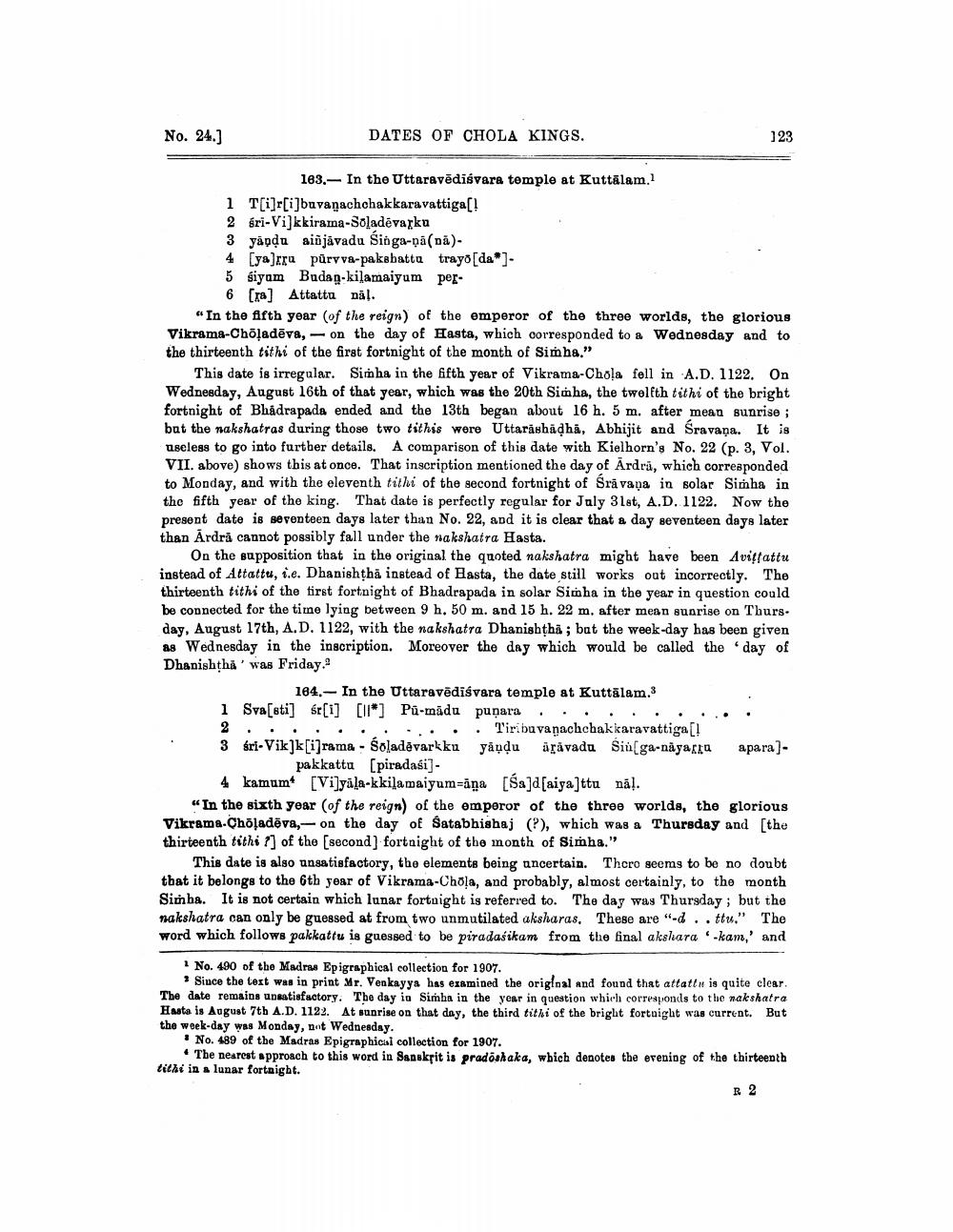________________
No. 24.]
DATES OF CHOLA KINGS.
163. In the Uttaravēdisvara temple at Kuttālam.1
1 T[i][i]buvanachchakkaravattiga[!
2 éri-Vilkkirama-Sōladēvarku
3 yapḍu aiñjāvadu Singa-ṇā(nā)
4 [yaru pūrvva-pakshattu trayō [da*]
5 siyam Budan-kilamaiyum per
6 [a] Attattu nāl.
123
"In the fifth year (of the reign) of the emperor of the three worlds, the glorious Vikrama-Chōļadēva, on the day of Hasta, which corresponded to a Wednesday and to the thirteenth tithi of the first fortnight of the month of Simha."
This date is irregular. Simha in the fifth year of Vikrama-Chola fell in A.D. 1122. On Wednesday, August 16th of that year, which was the 20th Simha, the twelfth tithi of the bright fortnight of Bhadrapada ended and the 13th began about 16 h. 5 m. after mean sunrise ; bat the nakshatras during those two tithis were Uttarashaḍha, Abhijit and Śravana. It is useless to go into further details. A comparison of this date with Kielhorn's No. 22 (p. 3, Vol. VII. above) shows this at once. That inscription mentioned the day of Ärdra, which corresponded to Monday, and with the eleventh tithi of the second fortnight of Śravana in solar Simha in the fifth year of the king. That date is perfectly regular for July 31st, A.D. 1122. Now the present date is seventeen days later than No. 22, and it is clear that a day seventeen days later than Ardra cannot possibly fall under the nakshatra Hasta.
On the supposition that in the original the quoted nakshatra might have been Avittattu instead of Attattu, i.e. Dhanishtha instead of Hasta, the date still works out incorrectly. The thirteenth tithi of the first fortnight of Bhadrapada in solar Simha in the year in question could be connected for the time lying between 9 h. 50 m. and 15 h. 22 m. after mean sunrise on Thurs. day, August 17th, A.D. 1122, with the nakshatra Dhanishṭhā; but the week-day has been given as Wednesday in the inscription. Moreover the day which would be called the day of Dhanishtha was Friday.
184. In the Uttaravēdisvara temple at Kuttalam.3 1 Sva[sti] śr[i] [*] Pu-mādu puṇara
2
Tiribavanachobakkaravattiga[]
3 śri-Vik]k[i]rama - Śōladēvarkku yaṇḍu ārāvadu Sin[ga-nāyar pakkatta [piradadi]
4 kamum [Vilyala-kkilamaiyum-iga [Sa][aiya]ttu nāļ.
apara]
"In the sixth year (of the reign) of the emperor of the three worlds, the glorious Vikrama-Chōladēva,- on the day of Satabhishaj (?), which was a Thursday and [the thirteenth tithi ?] of the [second] fortnight of the month of Simha."
This date is also unsatisfactory, the elements being uncertain. There seems to be no doubt that it belongs to the 6th year of Vikrama-Chola, and probably, almost certainly, to the month Simba. It is not certain which lunar fortnight is referred to. The day was Thursday; but the nakshatra can only be guessed at from two unmutilated aksharas. These are "-d. . ttu." The word which follows pakkattu is guessed to be piradasikam from the final akshara -kam,' and
1 No. 490 of the Madras Epigraphical collection for 1907.
Since the text was in print Mr. Venkayya has examined the original and found that attattu is quite clear. The date remains unsatisfactory. The day in Simha in the year in question which corresponds to the nakshatra Hasta is August 7th A.D. 1122. At sunrise on that day, the third tithi of the bright fortnight was current. But the week-day was Monday, not Wednesday.
No. 489 of the Madras Epigraphical collection for 1907.
The nearest approach to this word in Sanskrit is pradoshaka, which denotes the evening of the thirteenth tithi in a lunar fortnight.
R 2




